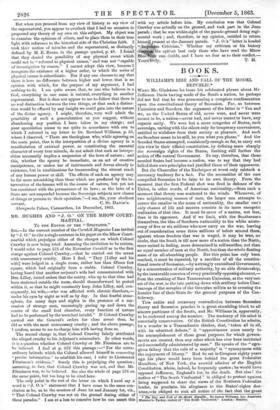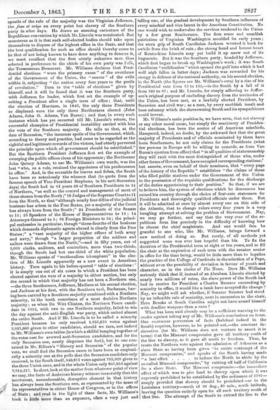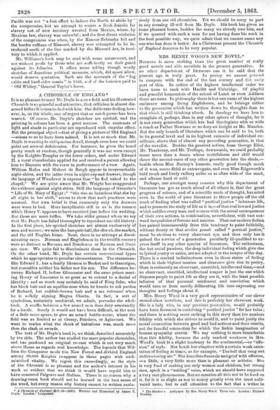BOOKS.
WILLIAMS'S RISE AND FALL OF THE MODEL REPUBLIC.•
WHEN Mr. Gladstone let loose his celebrated phrase about Mr Jefferson Davis baying made of the South a nation, he perhaps did not feel that he was pronouncing a complete condemnation upon the constitutional theory of Secession. For, as between Unionists and Seceders, the argument of the latter is " You and we, as the United States of old, never were, and never were meant to be, a nation—never had, and never meant to have, any organic unity. We were but a mere congeries of States, each sovereign, uniting with the others only for temporary convenience, entitled to withdraw from their society at pleasure. And such we Seceders mean to be still, be you what you please." And the Seceded States attempted, consistently enough so far, to carry out this view in their official constitution, by defining more sharply the sovereign rights of the States, limiting still further the action of tile central Government. To say, therefore, that these seceded States had become a nation, was to say that they had belied their own principles and justified those o f their opponents.
But the Chancellor of the Exchequer at worst only mistook a necessary tendency for a fact. For the necessities of the case compelled Secession to he false to its own theory. From the moment that the first Federal shot was fired in defence of the Union, in other words, of American nationality,—from such a moment that theory was scattered to the winds. Whenever, of two neighbouring masses of men, the larger one attempts to. coerce the smaller in the name of nationality, the smaller one's only chance of life and success consists in its more energetic realization of that idea. It must be more of a nation, not less, than is its opponent. And if we limit, with the Southerners themselves, the idea of Southern nationality to the white aristo- cracy of five or six millions who now carry on the war, leaving out of consideration some three millions of helots around them, against whose freedom that war is waged, it may be true, no doubt, that the South is till now more of a nation than the North, more united in feeling, more determined in self-sacrifice, not than an equal number of men at the North, but than the whole floating mass of its all-absorbing people. But this point has only been reached, it must be repeated, by a sacrifice of all the constitu- tional tenets of Secession, —by a strongly centralized Government, by a concentration of military authority, by an able dictatorship, by the inexorable coercion of every practically opposing element,— from the crushing of East Tennesseean Unionism, at the very out- set of the war, to the late putting down with artillery before Chat- tanooga of the scruples of the Georgian militia as to crossing the frontier line of their State for the general purposes of the Con- federacy.
This entire and necessary contradiction between Secession theory and Secession practice is a great stumbling-block to all sincere partizans of the South, and Mr. Williams is, apparently, to be reckoned among the number. The tendency of his mind is essentially conservative. Of the British Constitution he admits, for a wonder in a Transatlantic thinker, that, " taken all in all, with its admitted defects," it " approximates more nearly to the adeomplishment of those great purposes for which govern- ments are created, than any other which has ever been instituted and successfully administered by man." He speaks of the " egre- gious fallacy that the rule of a majority" is " synonymous with the enjoyment of liberty." Had he sat in Congress eighty years ago his place would have been behind the great Federalist Hamilton, of New York, the avowed admirer of the English Constitution, whom, indeed, he frequently quotes ; he would have opposed Jefferson, England's foe, to the death. But alas ! the author of "The South Vindicated " is obliged to protest against being supposed to share the views of the Northern Federalist leader, to proclaim his allegiance to the States'-rights doe- trine,—is obliged to sink all notice of the fact that the great
• The Bite and. Fall of the Model Reptsblic. By James Williams, late American Ministerto Turkey, author of" The South Vindicated." London : Bentley.
i has always been the Southern one, as represented by the mass of its representatives in either House of Congress, or in the offices of State ; and 'read in the light of these facts, Mr. Williams's book is little more than an exposure, often a very just and
telling one, of the gradual development by Southern influence of every mischief and vice latent in the American Constitution. No one would with to undervalue the services rendered to the Union by a few great Southerners. The firm sense and unselfish patriotism of Virginian Washington moulded its early years ; the stern grip of South Carolinian Jackson wrested it back for awhile from the brink of ruin ; the strong hand and honest heart of Kentuckian Lincoln may yet build it up anew out of its fragments. But it was the Southern party, headed by Jefferson, which first began to break up Washington's work ; it was South Carolinian "nullification" which opened the gulf into which it had well nigh fallen in latter days ; Jackson was rewarded for his energy in defence of the national authority, on his second election, in the North (the figures are Mr. Williams's own) by a rise of his Presidential vote from 73 to 132,—in the South by a fall of it from 105 to 87; and Mr. Lincoln, for simply adhering to Jeffer- son's original purpose of excluding slavery from the territories of the Union, has been met, as a lawfully elected President, by Secession and civil war ; as a man, by every snobbish insult and base calumny which the sliiveowning South and its sympathizers could invent.
Mr. Williams's main position is, we have seen, that not slavery or any other moral cause, but simply the machinery of Presiden-
tial elections, has been the source of all American mischiefs. Hampered, indeed, no doubt, by the awkward fact that the great majority of Presidents and of officials nominated by them have been Southerners, he not only claims for the Presidents (what few persons in Europe will be willing to concede, as from Van Buren's ejection from office) that "in all qualities of statesmanship they will rank with the most distinguished of those who, under other forms of Government, have occupied corresponding stations;' but asserts, even on behalf of their nominees, that " every page of the history of the Republic " establishes " the claims of those who filled public stations under the Government of the Union to the possession of the requisite qualifications for the discharge of the duties appertaining to their position." So that, if we are to believe him, the system of elections which he denounces has ruined his country through the choice of first-rate statesmen for Presidents and thoroughly qualified officials under them. But it will be admitted at once by almost every one on this side of the Atlantic, that to change rulers every four years is a very bungling attempt at solving the problem of Government. Nay, we may go further, and say that the very crux of the re- publican form lies precisely in the difficulty of knowing how to choose the chief magistrate. And one would fain be grateful to one who, like Mr. Williams, brings forward a new method of doing so. But surely, of all methods yet suggested none was ever less hopeful than his. To fix the duration of the Presidential term at eight or ten year s,,and to fill the chair at the expiration of each term with the senator senior in office for the time being, would be little more than to legalize the practice of the College of Cardinals in the selection of a Pope, without even the possibility of deviation in favour of youth and character, as in the choice of Pio Nono. Does Mr. Williams seriously think that if, instead of an Abraham Lincoln elected by nearly two millions of votes, the slave power of the South had had to receive for President a Charles Sumner succeeding by seniority to office, it would like a lamb have accepted the change ? Nay, we might well ask whether, if Senator Sumner had stood by an inflexible rule of seniority, next in succession to the chair, Hero Brooks of South Carolina might not have armed himself with deadlier weapons than a cane ?
What has been said already may be a sufficient warning to the reader against taking any of Mr. Williams's conclusions on trust. One enormous perversion of facts (habitual indeed in the South) requires, however, to be pointed out,—the constant in- sinuation (for Mr. Williams does not venture to assert it in terms) that the Missouri compromise gave all territory south of the line to slavery, as it gave all north to freedom. Thus, he treats the Northern vote against the admission of Arkansas as a slave State as having been given "in entire contempt of the Missouri compromise," and speaks of the South having made " a last effort . . . . to induce the North to abide by the so-called Missouri compromise," by cutting off half of California for a slave State. The Missouri compromise—the immediate effect of which was to give land to slavery upon which it was expressly prohibited to be established by the ordinance of 1787— simply provided that slavery should be prohibited—as to the Louisiana territory—north of 36 deg., 30 min., north latitude, leaving the question entirely open for all such territory south of that line. The attempt of the South to extend the line to the
Pacific was not " a last effort to induce the North to abide by " the compromise, bUt an attempt to secure a fresh domain for slavery out of new territory wrested from Mexico, Where, by Mexican law, slavety was unlawful ; and the first direct violation of the coinpromise was when, by, the Kansas-Nebraska bill and the border ruffians of Missouri, slavery was attempted to be in- troduced north of the line Marked by the Missend Act, in terri- tory to which it applied. Mr. Williams's book may be read with some amusement, and not without profit by those who are suffiAently on their guard against its fallacies. It offers some telling though wordy sketches of Amerioan political manners, which, did space allow, would deserve quotation. Such are the accounts of the "log cabin and hard cider mania" in 1840, and of the honours paid to " Old Whitey," General Taylor's horse.
































 Previous page
Previous page